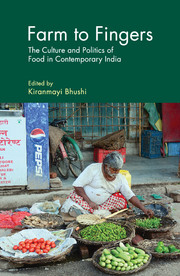Book contents
- Frontmatter
- Dedication
- Contents
- List of Figures and Tables
- Preface
- 1 Introduction
- 2 The Making of ‘Edible Animal Source Foods’ and its Contemporary Reality in Delhi
- 3 Appropriating the Cow: Beef and Identity Politics in Contemporary India
- 4 Eating Akhuni in India
- 5 Health, Standardization and ‘Bengali’ Sweets
- 6 Treating Children, Feeding Junk Food: An Inquiry into a Middle Class Project
- 7 Diaspora Dish: Cooking, Writing, and Creating Identities in Food-blogs
- 8 Measuring Hunger: Debates on an ‘Adequate’ Diet in Colonial North India
- 9 Managing Food: India's Experience with the Public Distribution System
- 10 Food Sovereignty: The Future of Food
- Contributors
- Index
7 - Diaspora Dish: Cooking, Writing, and Creating Identities in Food-blogs
Published online by Cambridge University Press: 05 July 2018
- Frontmatter
- Dedication
- Contents
- List of Figures and Tables
- Preface
- 1 Introduction
- 2 The Making of ‘Edible Animal Source Foods’ and its Contemporary Reality in Delhi
- 3 Appropriating the Cow: Beef and Identity Politics in Contemporary India
- 4 Eating Akhuni in India
- 5 Health, Standardization and ‘Bengali’ Sweets
- 6 Treating Children, Feeding Junk Food: An Inquiry into a Middle Class Project
- 7 Diaspora Dish: Cooking, Writing, and Creating Identities in Food-blogs
- 8 Measuring Hunger: Debates on an ‘Adequate’ Diet in Colonial North India
- 9 Managing Food: India's Experience with the Public Distribution System
- 10 Food Sovereignty: The Future of Food
- Contributors
- Index
Summary
Introduction: food-blogs and diasporic identities
[When] you are far away from your motherland, [y]ou tend to write down a small recipe diary interwoven with some bits and pieces of memories from your growing up years. But this time with a difference as it happens to be online and read by many, probably thousands out there.
Jayashree Mandal, ‘About Me’. Spice and Curry, para 1.Diasporic individuals are ‘transnationally situated’, traversing geo-cultural distances, and are simultaneously ‘rooted in particular histories, localities and community allegiances’ (Srinivas 2006: 211). Migrants remember their homeland through cultural signifiers like food, festivals, language, and dress in order to resist the flux of in-between-ness and to emplace themselves by re-experiencing memories of home. Food is a ‘potent site for the construction of memory’, and the ‘floating signifiers’ of food and home can be negotiated both privately and publicly (Holtzman 2006: 362). Diasporic identity is constructed by engaging with food in multiple ways: experientially (cooking and consuming) and discursively (writing and reading food). Food blogs, especially, offer a dynamic, heteroglossic space for reconfiguring identities by recording, reinterpreting, and exchanging stories in and around recipes. They are sites for fashioning the diasporic ‘self ‘ by communicating with the ‘other’ (progeny, family, community or readers from other communities), for remembering the past as a legacy to the future, and for negotiating between the old home/nation of origin and new home/host nation. As ‘transnational’ subjects, diasporic food bloggers use computer mediated communication and agency to ‘reformulate both the self and the place that the self dwells in’, creatively, collaboratively and continuously (Sahoo & De Kruijf 2014: xx).
This chapter attempts to study some of the food blogs by women in the Indian diaspora, located at privileged, urban, middle-class intersections, in order to examine how they participate in, and contribute to, individual, ethnic, national and global identity discourses through writings on food.
- Type
- Chapter
- Information
- Farm to FingersThe Culture and Politics of Food in Contemporary India, pp. 157 - 183Publisher: Cambridge University PressPrint publication year: 2017

